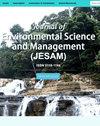菲律宾女性户主家庭对气候变化影响的社会脆弱性和适应能力:比较分析
IF 0.3
4区 环境科学与生态学
Q4 ENVIRONMENTAL SCIENCES
引用次数: 4
摘要
这项研究分析了南Camarines Lagonoy两个偏远沿海社区女性户主家庭的社会脆弱性和应对气候变化影响的能力。采用描述性相关研究设计的定量方法。在281名WHH中,162人被随机选为本研究的受访者。采用描述性统计、主成分分析(PCA)、独立样本t检验和多元线性回归分析对数据进行分析。两个偏远沿海社区的女户主家庭在人口、经济和社会因素方面具有中度至高度脆弱性。他们的社会脆弱性水平没有显著差异;然而,来自东部和北部沿海社区的受访者的适应能力存在显著差异。多元线性回归分析显示,残疾家庭成员的数量、与社会群体的关系、受访者的时间旅行和家庭规模是影响两个偏远沿海社区社会脆弱性的重要因素。该研究建议制定有效的气候变化政策和应对战略,以加强这些家庭的权利和福利,促进平等分配和获得资源,特别是在社区的社会政治结构中。本文章由计算机程序翻译,如有差异,请以英文原文为准。
Social Vulnerability and Adaptive Capacity to Climate Change Impacts of Women-headed Households in the Philippines: a Comparative Analysis
This study analyzed the social vulnerability and adaptive capacity to climate change impacts of women-headed households in two remote coastal communities in Lagonoy, Camarines Sur. Quantitative method following descriptive-correlational research design was employed. Out of 281 WHHs, 162 were randomly selected as the respondents of this study. Descriptive statistics, principal component analysis (PCA), t-test for independent samples, and multiple linear regression analysis were used to analyze the data. Women-headed households in the two remote coastal communities have moderate to high vulnerability in terms of demographic, economic, and social factors. No significant difference was found in their level of social vulnerability; however, a substantial difference was found in the adaptive capacity of the respondents from the East and North coastal communities. Multiple linear regression analysis revealed that the number of household members with disabilities, affiliation with social groups, time travel of the respondents, and household size were significant factors influencing social vulnerability in the two remote coastal communities. The study recommends formulating effective climate change policies and responsive strategies that enhance the rights and welfare of these households for equal distribution and access to resources, especially in socio-political structures in the community.
求助全文
通过发布文献求助,成功后即可免费获取论文全文。
去求助
来源期刊

Journal of Environmental Science and Management
ENVIRONMENTAL SCIENCES-
CiteScore
0.90
自引率
0.00%
发文量
10
审稿时长
2 months
期刊介绍:
The Journal of Environmental Science and Management (JESAM) is an international scientific journal produced semi-annually by the University of the Philippines Los Baños (UPLB).
JESAM gives particular premium to manuscript submissions that employ integrated methods resulting to analyses that provide new insights in environmental science, particularly in the areas of:
environmental planning and management;
protected areas development, planning, and management;
community-based resources management;
environmental chemistry and toxicology;
environmental restoration;
social theory and environment; and
environmental security and management.
 求助内容:
求助内容: 应助结果提醒方式:
应助结果提醒方式:


